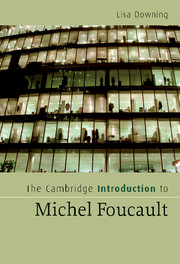Book contents
- Frontmatter
- Contents
- Preface
- List of abbreviations
- 1 Life, texts, contexts
- 2 Works: madness and medicine
- 3 Works: the death of man
- 4 Works: authors and texts
- 5 Works: crime and punishment
- 6 Works: The History of Sexuality
- 7 Critical receptions
- Afterword
- Notes
- Selected further reading
- Index
- The Cambridge Introductions to …
Preface
Published online by Cambridge University Press: 05 September 2012
- Frontmatter
- Contents
- Preface
- List of abbreviations
- 1 Life, texts, contexts
- 2 Works: madness and medicine
- 3 Works: the death of man
- 4 Works: authors and texts
- 5 Works: crime and punishment
- 6 Works: The History of Sexuality
- 7 Critical receptions
- Afterword
- Notes
- Selected further reading
- Index
- The Cambridge Introductions to …
Summary
If you knew when you began a book what you would say at the end, do you think that you would have the courage to write it? The game is worthwhile in so far as we don't know what will be the end.
Michel FoucaultA reading of the works of Michel Foucault (1926–84) does not so much equip us with new pieces of knowledge, or even teach us new and different ways of knowing. Rather, it invites us to share in a radical calling into question of the ways in which knowledge itself operates. Foucault argues that all forms of knowledge are historically relative and contingent, and cannot be dissociated from the workings of power. Destabilising many of the key facets of Western epistemology, he effectively lays bare their functioning. This agenda of demystification, central to all of Foucault's work, encourages an uncommon way of perceiving language, social structures and medical institutions, university disciplines, and sexual acts and identities. We are provided not with an alternative theory of these domains, but with an awareness of the force fields of influence that bring them into being and determine their meaning and operation in given cultural and historical contexts. So different is this way of apprehending knowledge that the reader new to Foucault, and to post-structuralist continental thought in general, may struggle with the rigorous challenges posed by his guiding methodologies of ‘archaeology’ and ‘genealogy’.
- Type
- Chapter
- Information
- The Cambridge Introduction to Michel Foucault , pp. vii - xPublisher: Cambridge University PressPrint publication year: 2008

